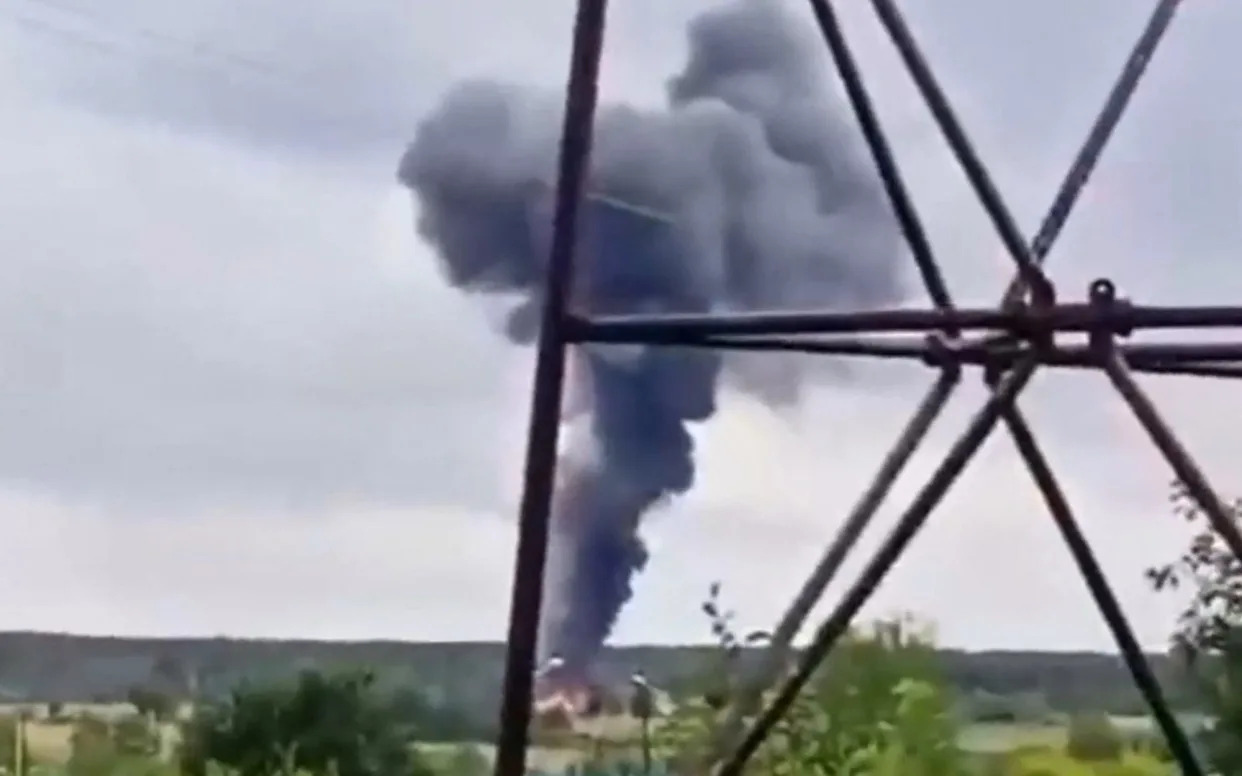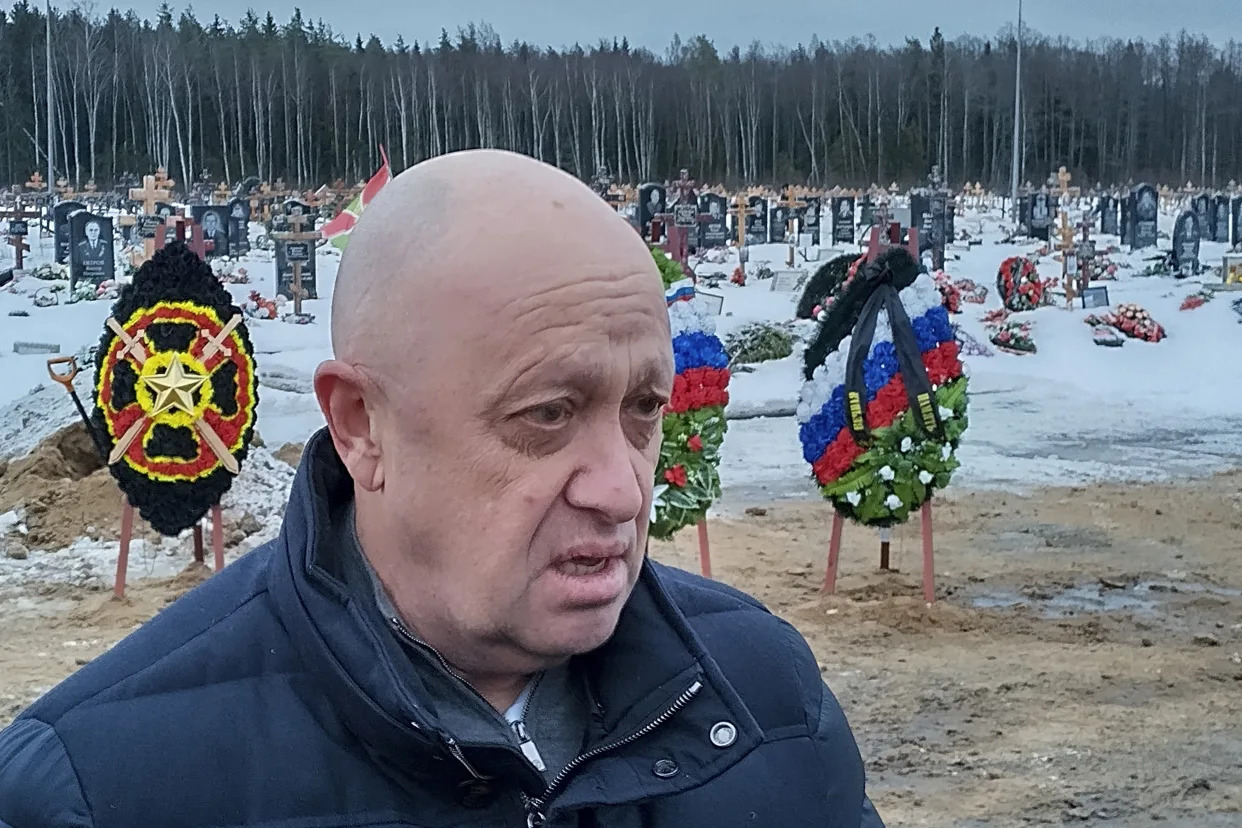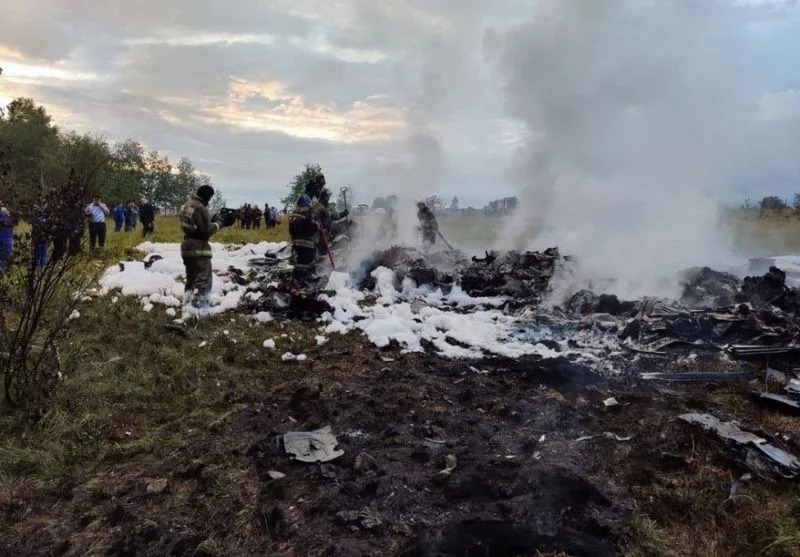Erin Snodgrass,Kelsey Vlamis
Wed, August 23, 2023

Yevgeny Prigozhin was a longtime ally of Russian President Vladimir Putin before staging a failed mutiny against the Russian defense ministry in June 2023.Getty Images
Wagner Group leader Yevgeny Prigozhin is presumed dead after his plane crashed on Wednesday.
His apparent death comes two months after he staged a failed mutiny against the Russian military.
Security officials and Soviet experts believe Putin is likely behind Prigozhin's death.
Yevgeny Prigozhin, the bombastic Wagner Group leader who led a short-lived uprising against Russia's defense ministry earlier this summer, is presumed dead after his business jet went down in a fiery crash outside of Moscow on Wednesday.
It was not immediately clear if Prigozhin was on the downed plane, though his name was on the flight manifest. Russian state media outlet TASS later appeared to confirm that Prigozhin and his second-in-command Dmitry Utkin, were among those dead, citing the Russian Federal Air Transport Agency.
Wagner-affiliated social media said Prigozhin was killed in the crash, blaming "traitors of Russia." The Russian defense ministry did not immediately comment on the matter.
Even as the immediate chaos of the situation dissipates and official statements are issued, few are likely to ever learn the full scope of the saga due to Russia's winding web of propaganda.
There is a chance this was an accident: but a warlord going rogue, stabbing his political benefactor in the back, so to speak, and then apparently dying in a freak plane crash seems like a bit of a stretch compared to some other alternatives.
Here are three possible explanations experts have put forward on what could have happened to Yevgeny Prigozhin based on what we know so far.
Scenario 1: Putin ordered Prigozhin's death
An assassination ordered by Russian President Vladimir Putin represents the "best explanation" for Wednesday's catastrophic plane crash, Simon Miles, an assistant professor at Duke University's Sanford School of Public Policy and a historian of the Soviet Union and US-Soviet relations, told Insider.
Putin, a notoriously unforgiving leader, had plenty of reasons to want Prigozhin dead after the mercenary leader led a mutiny against Russia's defense ministry in June seeking to oust top-level officials after he spent months publicly criticizing the Russian military's strategy in Ukraine. The uprising was short-lived but nonetheless represented the most prominent threat to Putin's regime in decades.
"It's no surprise that Putin would take his revenge," Robert English, a professor at the University of Southern California who studies Russia, the Soviet Union, and Eastern Europe, told Insider. "In fact, we Putin-watchers have been expecting it, and today it happened — on exactly the two-month anniversary of the Wagner mutiny."
In the months since the attempted coup, international officials and academic experts alike have been predicting Prigozhin's death. CIA Director Bill Burns suggested just last month that Prigozhin was living on borrowed time.

Yevgeny Prigozhin and Russian President Vladimir Putin in happier times — a 2010 tour of a school lunch factory outside Saint Petersburg.
"Putin is someone who generally thinks that revenge is a dish best served cold," Burns said at an annual security forum in Aspen. "In my experience, Putin is the ultimate apostle of payback so I would be surprised if Prigozhin escapes further retribution for this."
A seemingly uneasy truce emerged between Putin and Prigozhin after the uprising. Prigozhin was apparently exiled to Belarus for his role in the attempted coup, but seemed to spend much of the last two months traveling between St. Petersburg and Moscow, and even appeared to take a trip to Africa to visit his Wagner troops, Miles said.
Soon after the exile agreement was made public, Belarusian President Alexander Lukashenko claimed he was the one who stopped Putin from "wiping out" Prigozhin immediately after the uprising, Reuters reported, indicating Putin's desire for blood may have been brewing for months.
In the aftermath of the plane crash, an undated interview clip of Putin circulated on social media highlighting the president's distaste for disloyalty such as Prigozhin's revolt, which Putin expressly called a "betrayal."
"Does one need to be able to forgive?" the interviewer asks Putin.
"Yes, but not everything," the president replies.
"What can't be forgiven?"
"Betrayal," Putin says without hesitation.
The Russian president has a long history of making his enemies "disappear." At least 14 individuals linked to Putin's government have died under violent or mysterious circumstances since he took the presidency.
Following the Wednesday plane crash, US President Joe Biden suggested Putin could be behind the crash in comments to reporters.
"I'd be careful what I rode in," he said. "There is not much that happens in Russia that Putin is not behind."
Scenario 2: Someone else ordered Prigozhin's assassination
Up until his ill-fated uprising, Prigozhin remained a close ally of Putin. The mercenary leader's grievances were exclusively directed at the Russian defense ministry — not the president himself.
It is not "inconceivable" that elements within the military who were on the receiving end of Prigozhin's abuse could have taken action against the Wagner leader without Putin's approval, Miles told Insider.
"It's very hard at this early stage to put together an explanation for what we've seen that does not involve some state assets being used to knock this plane out of the sky," Miles said. It's unclear at this point what specifically caused the plane to crash, though some Wagner-affiliated social media channels suggested it was shot down.
It's the military that has access to such capabilities, he said, adding that the level of command needed to launch such an attack within the Russian military is "very low."

Founder of Wagner private mercenary group Yevgeny Prigozhin.Press service of "Concord"/Handout via REUTERS
This possibility could also account for Prigozhin's two months of seeming freedom following the coup, Miles said.
Why allow Prigozhin to live for weeks, flaunting his apparent immunity, if there were top-level plans to kill him, Miles posited. An immediate strike against Prigozhin would have sent a louder message and illustrated the immediate consequences awaiting traitors.
"He was running around basically unmolested since the coup attempt," Miles said of Prigozhin. It's possible members of the defense sector found that reality unacceptable, especially after members of the Russian armed forces were killed in his mutiny, and "decided to take matters into their own hands."
There is substantial evidence of dysfunction within the Russian government. Russia this week, for instance, fired Gen. Sergei Surovikin weeks after The New York Times reported he had advance knowledge of Prigozhin's mutinous plans, posing questions of whether the mercenary leader had help from within the military.
English, however, rejected the idea that someone within Putin's military would act without the president's explicit permission. But in ruling out a Russian defense perpetrator, English raised another potential culprit.
"Who else might want Prigozhin dead and have the capability to carry it out? Of course, the Ukrainians!" he told Insider.
Both English and Miles noted the "unnecessarily dramatic" and "aggressively public" manner of the plane crash — a stark departure from the mysterious deaths of other Putin foes from poison and falls out of windows.
"If so, it's a stroke of genius," English said of Ukraine's possible role in the incident. "Dramatically assassinate the killer of many Ukrainians. Pull off another brilliant strike inside Russia. Humiliate Putin. And all on the eve of Ukraine's independence day."
Scenario 3": Prigozhin is not dead
The most conspiracy theory-driven possibility of all is that the mercenary leader is not dead, and yet a Prigozhin fake death plot cannot be entirely ruled out, given the Wagner leader's affinity for disguises and doubles coupled with Russia's less-than-trustworthy media landscape.
Matthew Schmidt, an associate professor of national security and international affairs at the University of New Haven, said in comments shared with Insider that it is "prudent to be skeptical" of Russian government updates on the situation given "how Byzantine Russian politics is."
"People I know seriously argue it might not be the real Prigozhin," Schmidt said.
In the early hours following the plane crash, some on social media considered the possibility that Prigozhin had somehow faked his death, perhaps sending a double in his place.
A Pentagon official told The New York Times in July that Prigozhin was known to have used body doubles in the past, and photos of Prigozhin donning bizarre disguises were circulated by pro-Kremlin Telegram channels following his failed mutiny.
But the likelihood that Prigozhin managed to escape death seems to have lessened in the hours since the crash as more information becomes available and people turn to the most probable perpetrator: Putin.
Ben Riley-Smith
Wed, August 23, 2023

Prigozhin’s death was 'like some sort of Russian opera', said John Foreman, the former British defence attache in Moscow - AFP via Getty Images
British security sources believe that the shooting down of Yevgeny Prigozhin’s private jet was carried out by the FSB intelligence agency on the orders of Vladimir Putin.
“Of course it’s Putin,” one source said.
“Putin as a leader cannot afford to be humiliated in the way that he was. Putin functions on two things: Loyalty above talent… and the consequence of betrayal”.
Another said: “All the mood music, all the habits, all the history point to the FSB.”
The source added: “The FSB remains loyal to Putin.”
Sir Richard Dearlove, the former head of MI6, told the Telegraph that news of Prigozhin’s death was “unsurprising”.
“Most people will jump to the conclusion that this isn’t an accident,” he said.
‘Putin’s revenge’
“I’m sure it’ll be presented as an accident and there will be an element of doubt but everyone in the West will come to the same conclusion that this is Putin’s revenge on people who challenge his power base.”
He added: “We used to have a saying when I worked on the Soviet Union, which was that the wise line to take on Soviet Russia was that nothing happened by accident and one might apply that to this event.”
John Foreman, the British defence attache in Moscow from 2019 to 2022, told the Telegraph that Prigozhin’s death was “like some sort of Russian opera”.
“The timing is not accidental,” he said.
“Two months to the day Prigozhin had his march on Moscow, his mutiny, a few days later he’s dead. Mr Putin’s revenge has been served on Prigozhin. The speed with which the Russian system has acknowledged it strikes me as preorganisation has been going on.”
‘Only a question of time’
He added: “Putin is willing to take revenge against those who threaten him and sends a chilling effect to anyone who wants to come for him. It’s in the daytime, all over the media, anyone else thinking they would come for the tsar will think again. It shows the brutality and violence at the heart of the Russian regime, which is how he has stayed in power for so long.”
Orysia Lutsevych, deputy director of the Russia and Eurasia programme and head of the Ukraine forum at Chatham House, said: “If Prigozhin is indeed dead, as claimed, it is a logical development that follows a failed mutiny against the Kremlin.
“After the revolt that challenged Putin’s narrative about the invasion of Ukraine and undermined his stronghold on power, it was only a question of time and mode of Prigozhin’s elimination.
“Alive, he was always a threat and a reminder that Putin is weak. It remains to be seen if Prigozhin’s supporters just swallow a bitter pill or further grow their ranks. In any case, the conflict within security and defence agencies of Russia will only deepen, as Ukraine’s summer and fall offensive further degrades Russian armed forces.
Alexander Ward
Wed, August 23, 2023

AP Photo
While the news of Yevgeny Prigozhin’s death stunned the world, the response within official Washington was a collective shrug.
Officials demurred from commenting on the circumstances of the downing of a flight with Prigozhin aboard, stressing instead that everyone knew this was the likely outcome of his failed mutiny against Moscow in June and that it doesn’t change the U.S. calculation on Russia or its war in Ukraine.
Asked during his vacation in Lake Tahoe if Russian President Vladimir Putin was behind the crash of Prigozhin’s private plane, carrying him and nine others, President Joe Biden said “there’s not much that happens in Russia that Putin’s not behind, but I don’t know enough to know the answer.”
The Wagner Group chief, a once-close Putin confidant and a backer of coups and repressive governments around the world, had widely been considered a dead man walking ever since his June insurrection. Russia’s civil aviation agency confirmed Wednesday that Prigozhin was aboard the doomed aircraft.
Adrienne Watson, the National Security Council’s spokesperson, said before confirmation of Prigozhin’s demise that “no one should be surprised” by the initial reports. “The disastrous war in Ukraine led to a private army marching on Moscow, and now — it would seem — to this.”
Sen. Mark Warner (D-Va.), chair of the Senate Intelligence Committee, stated Wednesday “no one should mourn Prigozhin’s death,” adding that it’s “another reminder of the brutality of the Putin regime, and why we must continue our support for Ukraine in its fight for freedom.”
So far, little seems to have shifted in terms of thinking or operations inside the administration. Officials seek more intelligence about what occurred, but ultimately they expect Putin to stay the course in Ukraine. Not having to contend with Prigozhin, who was openly critical of the Kremlin’s conduct of the invasion, could help Putin consolidate control and tamp down internal rivalries.
Experts warn that the administration will encounter a different Wagner Group now that Prigozhin is gone. “It’s the definitive end of Wagner as we knew it,” the RAND Corporation’s Samuel Charap summarized.
Charap and four other U.S.-based Russia watchers said in interviews that Moscow will likely let the mercenaries act with pseudo independence in Africa, likely under the leadership of a quieter figure.
“You don’t want to be well known because it makes you a threat to the regime,” said Alina Polyakova, president and CEO of the Center for European Policy Analysis.
Eric Green, who recently left the NSC as the top Russia specialist, said “it will be hard for Russia to project power in Africa as effectively without Prigozhin.” He added: “Prigozhin was an odious human being but he had managerial skills and a kind of charisma. That’s not easy to replicate.”
Meanwhile, the Russian Defense Ministry will continue to bring some Wagner forces into the official military, perhaps deploying them as special forces in Ukraine or elsewhere, experts agreed.
The Center for Strategic and International Studies’ Max Bergmann argues that removing Wagner’s beloved leader might backfire on Putin. “Decapitating Wagner — an effective tool for the Kremlin globally and in Ukraine — keeping incompetent loyalists in charge of the war, and removing effective generals will lead to growing frustration in the ranks, especially if there are more battlefield losses,” he said.
More tumult inside Russia’s ranks could further complicate Putin’s war on Ukraine, giving Kyiv a boost as its counteroffensive sputters and inspiring confidence in Ukraine’s Western backers to further pump arms into the fight.
In the immediate term, there “certainly is no effect on U.S. policy,” said Green.
The largest looming question is what Moscow will do with the more than 3,000 Wagner mercenaries in Belarus. They’ve been training Belarusian special forces near the Polish border, spooking the NATO country and Western powers. The mercenaries could come back to Russia to serve in the conventional military, but, if so, those who served alongside Prigozhin in the short-lived revolt will be met with skepticism.
Loyalty to Prigozhin is still on display in Russia. Images circulating online showed the windows of Wagner’s headquarters in St. Petersburg lit up in the shape of a cross.
Russian mercenary Yevgeny Prigozhin's plane appeared fine on radar until last 30 seconds
Valerie Insinna and Allison Lampert
Wed, August 23, 2023

Plane crash in Tver region
(Reuters) - An Embraer Legacy 600 executive jet, believed to have carried Wagner mercenary chief Yevgeny Prigozhin to his death on Wednesday, showed no sign of problem until a precipitous drop in its final 30 seconds, according to flight-tracking data.
Rosaviatsia, Russia's aviation agency said Prigozhin, who led an aborted mutiny in June, was one of 10 people on board the downed plane. It was traveling from Moscow to St. Petersburg when it crashed near the village of Kuzhenkino in the Tver Region, Russia's emergency situations ministry said.
At 3:19 p.m. GMT, the aircraft made a “sudden downward vertical,” said Ian Petchenik of Flightradar24. Within about 30 seconds, the aircraft had plummeted more than 8,000 feet from its cruising altitude of 28,000 feet.
“Whatever happened, happened quickly,” Petchenik said.
“They may have been wrestling (with the aircraft) after whatever happened," Petchenik said. But prior to its dramatic drop, there was "no indication that there was anything wrong with this aircraft.”
Video showed the plane descending rapidly with its nose pointing almost straight downward and a plume of smoke or vapor behind it.
Russian investigators opened a criminal probe to determine what happened. Some unnamed sources told Russian media they believed the plane had been shot down by one or more surface-to-air missiles. Reuters could not confirm that.
Brazilian planemaker Embraer SA said it had not been providing any service or support in recent years to the plane, which seats around 13.
The company said in a statement it has complied with international sanctions imposed against Russia. The luxury jet was identified on Flightradar24 with registration RA-02795, the same as the plane that carried Prigozhin to Belarus after the mutiny, an industry source familiar with the matter said.
Online flight tracker Flightradar24 last recorded the position of the aircraft at 3:11 p.m. GMT, before the crash. Jamming or interference in the area probably slowed the collection of further location data.
Other data continued for nine minutes. Flightradar24 said the jet went thorough a series of ascents and descents of a few thousand feet each over 30 seconds before its final, disastrous plunge. Flightradar24 received its final data on the jet at 3:20 p.m.
(Reporting by Valerie Insinna in Washington, Allison Lampert in Montreal; additional reporting by Gabriel Araujo in Sao Paulo and Caroline Pulice in Mexico City; Editing by Cynthia Osterman)
Embraer jet model that crashed, reportedly carrying Prigozhin, had good safety record
Carolina Pulice and Gabriel Araujo
Updated Wed, August 23, 2023

European Business Aviation Convention & Exhibition (EBACE) in Geneva
(Reuters) -The Embraer executive jet model that crashed in Russia, apparently with Wagner mercenary chief Yevgeny Prigozhin onboard, has only recorded one accident in over 20 years of service, and that was not related to mechanical failure.
Russian authorities said Prigozhin was listed as a passenger on a private jet that crashed on Wednesday evening, killing all those onboard. Russia's TASS news agency said the plane was a Brazilian Embraer jet.
Embraer said it was aware of a plane crash in Russia involving a Legacy 600 aircraft, but it did not have further information about the case and had not been providing support services for the jet since 2019.
"Embraer has complied with international sanctions imposed on Russia," the planemaker said. Sanctions block Western planemakers from providing parts or support for planes operated in Russia.
Flightradar24 online tracker showed that the Embraer Legacy 600 (plane number RA-02795) said to be carrying Prigozhin had dropped off the radar at 6:11 p.m. local time (1511 GMT). An unverified video on social media showed a plane resembling a private jet falling out of the sky toward the earth.
The Legacy 600 entered service in 2002, according to International Aviation HQ, with almost 300 produced until production ceased in 2020.
There is only one recorded accident involving a Legacy 600, according to International Aviation HQ, which occurred in 2006 when it crashed mid-air into a Gol Boeing 737-800 on its way from the Embraer factory in Brazil to the United States.
Despite damage to the aircraft, the pilot landed the Embraer plane and there were no deaths or injuries. The Boeing commercial airliner was downed and all 154 passengers killed.
Two years later, a Brazilian air force report blamed two U.S. pilots, traffic controllers and faulty communications for the mid-air collision.
At the time, a lawyer for the pilots said individual air traffic controllers and flaws in Brazil's air traffic control system caused the accident.
(Additional reporting by Allison Lampert; Editing by Gabriel Stargardter and Stephen Coates)
No comments:
Post a Comment